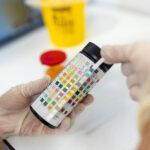Checking in: A new mom's guide to well-baby checkups
Get ready to spend a lot of time getting to […]
Get ready to spend a lot of time getting to know the newest VIP in your life: your family’s pediatrician. Most doctors recommend a schedule of seven well-child visits during your baby’s first year of life to properly monitor growth and development. We spoke with Ari Brown, MD, pediatrician and co-author of Baby 411, to find out what to expect during baby’s first year of checkups.
At every appointment
There are a few things your doctor will likely check your baby for and discuss with you during each visit.

Your child’s weight, length and head circumference will be measured and noted. Expect to see these measurements displayed on a growth chart indicating what percentile he falls in for his age range. His progress will be monitored throughout childhood to ensure he is growing at a steady rate.
Eating habits:
Your doctor will ask about your baby’s input and output each time she sees him: She’ll be interested in how often and how long he’s eating, as well as how many diapers he wets and soils daily. If you’re bottle-feeding, she’ll also want to know how many ounces he consumes at each meal.
Sleeping habits:
Expect your doctor to ask how many consecutive hours your baby sleeps at night and how many naps he takes during the day. She’ll probably remind you to reduce the risk of SIDS by putting baby to sleep on his back, and may stress the importance of tummy time, which is essential for developing important muscles and skills and preventing “flat head syndrome.”
Development:
While all babies progress at different rates, there are indicators at each age that help rule out any potential problems. Your pediatrician will examine everything from vision and hearing to age-appropriate physical and communicative skills.
VISIT 1: Newborn follow-up
Highlights:
At baby’s first checkup, your doctor will assess him for jaundice, which is caused by a buildup of bilirubin in your baby’s blood; it occurs when your infant’s body doesn’t eliminate waste properly. While jaundice isn’t uncommon and is often cured fairly easily, it can be bad news if it goes untreated. Let your doctor know if your newborn’s skin or eyes appear yellowish, and also note the color of your baby’s poop. If it changes from black to yellow or green, that’s a good indicator that your new guy’s digestive system is on track.
Vaccination station:
If your baby didn’t receive his first hepatitis B shot in the hospital, your doctor might recommend that he get it at his newborn follow-up visit.
VISIT 2: 2-week checkup
Highlights:
By week two, your little one should have reached or exceeded his birth weight. Your child will receive his second newborn screening test at this visit as well. (The first should have been performed right after birth, before you left the hospital.)
Vaccination station:
If your baby still hasn’t received his first dose of Hep B, it might be administered at this visit.
VISIT 3: 2-month checkup
Highlights:
By this stage, your little guy should be able to focus on you, make eye contact, and smile in response to stimulation (such as mommy grinning). Physically, doctors like to see babies lifting their heads while on their bellies at 2 months. Sleep is another factor at this checkup: “I don’t expect a long stretch for anyone yet, but I’ll ask,” says Brown.
Vaccination station:
This is usually the first big round of shots. The CDC-recommended schedule includes the first doses of DTaP, Hib, IPV and PCV. Your baby will also get either his first or second dose of Hep B—docs often use a combo shot to cut down on the frequency, so it can vary—and his first round of RV, which is given orally.
VISIT 4: 4-month checkup
Highlights:
According to Brown, “A growing, full-term baby should be able to sleep through the night—definition: six hours—by 4 months.” Expect to talk about sleep routines, removing sleep crutches, regular nap times and more. Additionally, your pediatrician will ensure that your baby has achieved certain physical milestones, including the abilities to hold his head up steadily and roll over.
Vaccination station:
The second doses of DTaP, Hib, IPV, PCV and RV are due; Hep B might be required, depending on your child’s dose schedule.
VISIT 5: 6-month checkup
Highlights:
Solid food comes into play for most families at the 6-month mark. “I recommend waiting on solid foods until 6 months, [but] some doctors start between 4 and 6,” notes Brown. Your doctor should talk to you about which types of food are safe (Brown points out that high-allergy food recommendations have changed as of 2009), choking hazards, advancing volumes and textures, and high priority nutrients such as iron, zinc and fiber. Your doc might also check in to see what kind of water your household uses, so she can determine whether or not your baby will require a fluoride supplement.
Vaccination station:
It’s time for the third doses of DTaP, Hib, IPV, PCV, RV and Hep B. If it’s flu season, your baby can also get his first round of the flu vaccine.
VISIT 6: 9-month checkup
Highlights:
He’s on the move! Your pediatrician will want to know if your baby is moving in some way, whether it’s crawling, cruising or scooting. He should also be picking up small items, feeding himself finger foods, and exhibiting signs of social development—he might cry when you leave him places or seem scared of strangers. A blood sample will also be drawn to screen for anemia and lead exposure.
Vaccination station:
Maybe none! A third dose of Hep B or IPV might be required, depending on whether or not your child received combo doses. A flu shot might also be recommended—babies need two doses, given one month apart, the first time they receive the flu vaccine.
VISIT 7: 12-month checkup
Highlights:
It’s time to lose the bottle and switch to whole milk, or 2 percent milk for a very large baby—a 2009 recommendation by the American Academy of Pediatrics. Since toddlers are often picky, diet will also be discussed so you can make sure your tot gets the nutrients he needs. Your doctor will check for several developmental highlights, such as baby recognizing his own name and saying “mama” and “dada” with meaning (that is, to identify you, not just to babble).
Vaccination station:
It’s time for round one of MMR and hepatitis A, as well as dose four of PCV; some doctors might recommend dose one of varicella and shot four of DTaP and Hib, while others will give these at your baby’s 15-month checkup.







